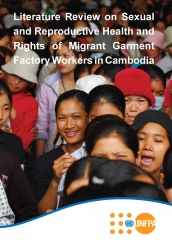
Youth on the Move Cambodia: Baseline Survey Results
Publication Year: 2015 / Sources: World EducationThe baseline survey assessed the likelihood of students to drop out of school and migrate, as well as their perceptions of the quality and relevance of the education provided by their schools, their own level of engagement and voice in school affairs, and knowledge about safe migration.
Download: English | Khmer
Cambodia: A Survey of Livelihood Strategies and Expectations for the Future
Publication Year: 2015 / Sources: The Asia FoundationWith this research, The Asia Foundation continues to provide analysis and insight into the remarkable economic, social, and political changes occurring today in Cambodia. The aim of this report is to better understand the most recent social, political, and economic trends among various social groups in Cambodia, by canvassing their opinions of and expectations for economic improvement, social reform, and political choice, locally and nationally.
Download: English | Khmer
Access to Justice for Children: Cambodia
Publication Year: 2016 / Sources: Child Rights International Network (CRIN)The Constitution of the Kingdom of Cambodia 1993 (the “Constitution”) does not explicitly determine the status and authority of international treaties. However, it requires the state to recognise and respect the rights stipulated in human rights conventions, including the Convention on the Rights of the Child (CRC). Child Rights International Network (CRIN) ranked Cambodia 166 out of 197 countries for the effectiveness of its courts in protecting children in 2015.
Download: English | Khmer
Implementation of the International and Regional Human Rights Framework for the Elimination of Female Genital Mutilation
Publication Year: 2014 / Sources: United Nations Population Fund (UNFPA)Before the 1990s, the international community did not view violence against women in general and more specifically Female Genital Mutilation (FGM) as a major issue. If violence against women was recognized as an issue at all, it was seen as under the purview of national governments, not a subject of international law. Violence against women was widely viewed as a private act or a domestic matter carried out by private individuals. For this reason FGM was initially placed beyond the scope of international human rights law.
Download: English | Khmer
2014 Cambodia Demographic and Health Survey Key Findings
Publication Year: 2015 / Sources: National Institute of Statistics, Directorate General for Health and ICF InternationalThe objective of the survey was to provide reliable estimates on infant and child mortality, fertility preferences, family planning behavior, maternal mortality, utilization of maternal and child health services, health expenditures, women’s status, and knowledge and behavior regarding HIV/AIDS and other sexually transmitted infections that can be used by program managers and policymakers to evaluate and improve existing programs.
Download: English | Khmer
Literature Review: Sexual and Reproductive Health and Rights of Migrant Garment Factory Workers in Cambodia
Publication Year: 2014 / Sources: The United Nations Population Fund (UNFPA)In Cambodia, there are a signi cant number of migrant factory workers, and most of them are female adolescents and youth, living around Phnom Penh. us there is a need to support and respond to their health needs, particularly their sexual and reproductive health and rights. However, very little is known at the national level about the health status and needs of this group.
Download: English | Khmer
Every Person Counts: Promoting the Inclusion of Persons with Disabilities in the Health Sector in Cambodia
Publication Year: 2015 / Sources: Deutsche Gesellschaft für Internationale Zusammenarbeit GmbH (GIZ)Cambodia’s public health system is not well equipped to meet the needs of persons with disabilities, or to diagnose and treat impairments which could become disabling. Barriers encountered by persons with disabilities when accessing care include high direct and indirect costs, the physical inaccessibility of health facilities, communication barriers, and negative attitudes on the part of health care workers.
Download: English | Khmer
The Culture and Traditional Authority of Indigenous People and the Development Paradigm
Publication Year: -- / Sources: Development and Partnership in Action (DPA)The culture of indigenous peoples in Cambodia is under threat. The environment in which indigenous communities live is changing rapidly and this is having a profound impact within the community itself. Historically, cultural practices and traditional authorities are forces maintaining the collective identity, solidarity and cohesion of indigenous communities and, importantly, protecting communal rights and assets such as land and natural resources.
Download: English | Khmer
Improving Health Service Delivery in Cambodia
Publication Year: 2014 / Sources: Care CambodiaSince October 2012, the project has focused on improving access to and utilisation of health services, particularly
in very remote communities. This focused on increasing skills and motivation among frontline health workers including midwives and community health volunteers who are part of Village Health Support Group (VHSGs) – so healthcare facilities can provide better services.

The Economic Burden of the Health Consequences of Violence Against Children in Cambodia
Publication Year: 2015 / Sources: Royal Government of Cambodia & UNICEF CambodiaViolence against children exists in every country in the world, cutting across culture, class, education, income and ethnic origin. Sadly, Cambodia is no exception. Childhood violence can have lifelong adverse health, social and economic consequences for survivors, including behavioural problems and cognitive dysfunction; mental and physical health conditions…etc.
Download: English | Khmer